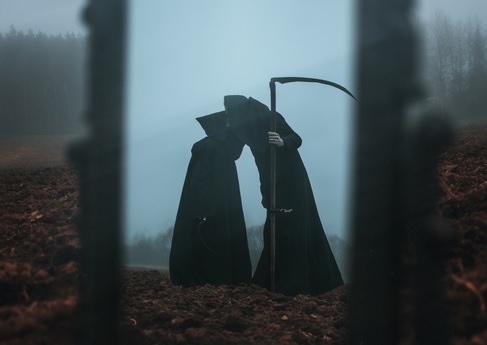NordenBladet – There are common questions people have about death, as it´s a topic that is both personal and universal. All these questions are intriguing in the sense that they are all related to the unknown, the mystery and the fear of what lies beyond our physical existence. Everyone has their own unique perspective and relationship with death, and it can be influenced by factors such as culture, religion, personal beliefs, and life experiences.
But there are certain groups of people who may be more interested in death than others. Some examples include:
Health care professionals: People who work in health care, such as doctors, nurses, and hospice workers, may be more interested in death as it is a part of their daily work. They may also have a desire to understand the process of dying in order to better assist their patients.
Grief counselors and death educators: People who work in fields related to grief and bereavement, such as counselors, social workers, and death educators, may be more interested in death as it is a central part of their work.
Researchers: Scientists and scholars who study death and dying, such as anthropologists, sociologists, and theologians, may be more interested in death as it is a subject of academic research.
Artists, poets, writers and filmmakers: Artists and creators may be more interested in death as it can be an inspiration and source of material for their art.
People who have experienced a significant loss: Individuals who have experienced the death of a loved one may be more interested in death as they seek to understand and come to terms with their loss.
Spiritual seekers: People who are interested in spirituality and the meaning of life may be more interested in death as it can be seen as a step in the journey of the soul.
Many writers throughout history have written about death in their literature.Here are just a few examples of writers who have dealt with death in their work.
Our reading recommendations. HERE ARE ten famous writers in the world who touch the theme of death in their work:
Edgar Allan Poe: Known for his dark and macabre stories, Poe wrote extensively about death, often exploring themes of premature burial, premature mourning and the macabre.
Samuel Beckett: His work often dealt with the human condition, the nature of existence and the inevitability of death.
Albert Camus: He wrote extensively about the human condition and the absurdity of life, and often dealt with the subject of death in his work.
Emily Dickinson: She wrote many poems that dealt with death and immortality, often exploring themes of grief, loss, and the afterlife.
T.S. Eliot: His poem “The Waste Land” and others, deals extensively with death, decay, and the collapse of civilization.
W.B. Yeats: He wrote many poems that dealt with the subject of death, often exploring themes of immortality, and the eternal cycle of life and death.
Arthur Miller: His play “Death of a Salesman” is a classic exploration of death, grief and the human condition.
Gabriel Garcia Marquez: His famous book “One Hundred Years of Solitude” deals with death, grief, and the cyclical nature of life.
Virginia Woolf: Her work often deals with the subject of death, exploring themes of grief, loss, and the fleeting nature of life.
Harold Pinter: His plays often deal with the human condition, exploring themes of death, the passage of time, and the nature of existence.
Featured image: Pexels
Source: NordenBladet.ee

